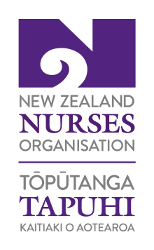 New Zealand Nurses Organisation (NZNO) media release, 7 April 2020
New Zealand Nurses Organisation (NZNO) media release, 7 April 2020
NZNO urgently needs the Government and all health employers to commit to a comprehensive ‘He Kete Tapuhi Ora response package’ to assist all nurses, midwives, health care assistants and kai mahi hauora in this exceptional fight against the COVID-19 emergency and rāhui.
The seriousness of this virus coupled with projected community transmissions and hospitalisation rates place extraordinary pressure on our already stretched health care system. As international evidence strongly indicates, we require a well-resourced, sustainable nursing workforce to respond to community testing and cope with the unpredictable surges in COVID-19 cases.
NZNO Kaiwhakahaere Kerri Nuku says it is essential that all nurses, midwives, health care assistants and kai mahi hauora are properly supported to safely carry out this work across all health care sectors.
"We’ve drafted He Kete Tapuhi Ora (our Wellness Package) to reflect the concerns and anxieties that colleagues and myself hear daily from members, which primarily include difficult working conditions and critically needed personal protective equipment and financial support.
"Within that we have to address the fact that primary health care providers, and particularly Māori and Iwi providers, already have less resources to start with. This package requires an equity lens to ensure the just distribution of resources."
Ms Nuku also stresses that support for frontline workers needs more than a focus on technical guidelines.
"It is clear from our members that we need to look at people’s overall wellbeing, for instance understanding that putting on protective equipment and working with confirmed COVID-19 cases is mentally, emotionally and spiritually draining and our people need support to work through that.
"Likewise, we need to focus on all factors that enable health care workers to do their job and to stay physically and emotionally well, as well as accounting for the often conflicting duties they have to their whānau.
"Unless we address health and wellbeing as a whole, we will continue to see our frontline workers go into financial hardship, burn out, or have no choice but to leave work for their whānau, or leave whānau for their work."
The full ‘He Kete Tapuhi Ora’ response package is as follows:
1. Consistent use of personal protective equipment (PPE) across all health sectors following a precautionary principle.
2. Provision for additional pay recognition, acknowledging their invaluable contribution as an essential health care worker. These provisions are above those in current collective employment agreements.
3. Provision to retention of full income.
4. Priority testing for COVID-19;
5. Free general practice consultations, additional wellbeing and psychosocial support packages (including EPA counselling, cultural support and professional supervision).
6. Provisions for sick leave and annual leave in current collective employment agreements to be upheld and improved for current circumstances.
7. Vulnerable worker assessment for pre-existing conditions of workers and their whānau.
8. Nurses working in high risk COVID-19 work areas are provided with accommodation, if needed, to protect themselves or their whānau.
9. Job security and reassurance that no health care workers will be disciplined for speaking out about health and safety issues when using appropriate channels.
10. Free travel to and from work, including public transport or other forms where necessary.
11. When the time comes for us to work long hours, employers to provide cooked meals available in the workplace while on duty.
12. Childcare or provision for childcare support to enable workers to be on duty.
13. Employers laundering of uniforms in the workplace to reduce the risk of transmission to the whānau of staff.
"In this time of confusion and anxiety, the ‘He Kete Tapuhi Ora’ response package will give our frontline workers reassurance, certainty, and hope in the COVID-19 crisis and rāhui, particularly when they are making daily personal and whānau sacrifices for us all," Ms Nuku said.
He waka eke noa, we are all in this together